Artifactory Plugin - Versions Prior to v22.11.2
Note: There are major changes from Artifactory plugin version v22.6.1 to version v22.11.2. For documentation on versions v22.11.2 and newer, please see here.
Overview
Proxy settings are relevant for requests for Mend servers only. Proxy for remote repository requests is not supported.
This topic describes how the JFrog Artifactory plugin integrates with Mend. The plugin adds additional information to the Artifactory artifacts and updates Mend. Once invoked, all the artifacts' metadata on the Artifactory will be uploaded to the Mend inventory. The Artifactory plugin supports two use cases: Mend’s SCA and Supply Chain Defender (SCD).
Artifactory instance is mapped to Mend product.
Artifactory repositories will be mapped to Mend projects.
Policies will be enforced and policy details will be added to the artifacts property tab: WSS-Action (Approve/Reject) and WSS-Policy-Details.
Additional data for each artifact will be added to the property tab: WSS-Licenses, WSS-Description, WSS-Homepage and WSS-Vulnerabilities.
The plugin is licensed under the Apache 2.0 license.
NOTES
The Mend inventory will be updated only when using a cron-based job, if the
updateWssproperty is set to true.Artifactory editions not supported by the Groovy-based User Plugins are not supported by Mend.
Scanning of Docker repositories is not supported.
Scanning of virtual repositories is not supported.
The recommended integration method for the JFrog Artifactory is using the Unified Agent.
Updates in Artifactory: The plugin updates Artifactory repositories with no more than 10,000 artifacts.
Updates in Mend: The plugin updates Mend with repositories with no more than 2,000 artifacts.
How the Artifactory Plugin Works
The Artifactory plugin works in the following modes:
Cron-based job: When invoked, repository artifacts will be updated in Mend and additional data will be added to the property tab of each artifact.
After create: In this mode, when a new artifact is uploaded to Artifactory, Mend policies are triggered and additional data is added to the property tab of the artifact. This mode is controlled by the
triggerAfterCreateproperty.Before download: In this mode, only Mend policy-approved artifacts will be downloaded from remote or local repositories. This mode is controlled by the
triggerBeforeDownload(for downloading from local repositories) andtriggerBeforeRemoteDownload(for downloading from remote repositories) properties).
Downloading the Plugin
The latest version of the Artifactory Plugin and its download can also be accessed by visiting our Product Downloads page.
Latest Version | ZIP Download (Amazon S3) | Features |
|---|---|---|
22.11.2 |
Previous versions of the Artifactory Plugin can be found here.
NOTE: The Artifactory Plugin versions will be available and supported for a year after their release.
Installing the Plugin
NOTE: For details on how to migrate from a version of the Artifactory Plugin earlier than 21.12.1, see Migrating the Artifactory Plugin.
Artifactory Version <= 6.x
Download the zip file and extract it.
Replace the
whitesource-artifactory-plugin.propertiesandwhitesource-artifactory-plugin.groovyfiles under${ARTIFACTORY_HOME}/etc/plugins.Create a new
libfolder under:${ARTIFACTORY_HOME}/etc/plugins.Place the new
whitesource-artifactory-plugin-VERSION.jarfile in theplugins/libdirectory.Update the
whitesource-artifactory-plugin.propertiesfile with the appropriate parameters (see Cron Scheduling Example and General Parameters).Schedule the cron job in the
whitesource-artifactory-plugin.groovyfile (see Cron Scheduling Example).Restart Artifactory.
Artifactory Version >= 7.x
Download the zip file and extract it.
Replace the
whitesource-artifactory-plugin.propertiesandwhitesource-artifactory-plugin.groovyfiles under${ARTIFACTORY_HOME}/var/etc/artifactory/pluginsCreate a new
libfolder under${ARTIFACTORY_HOME}/var/etc/artifactory/plugins.Place the new
whitesource-artifactory-plugin-VERSION.jarfile in theplugins/libdirectory.Update the
whitesource-artifactory-plugin.propertiesfile with the appropriate parameters (see Cron Scheduling Example and General Parameters).Schedule the cron job in the
whitesource-artifactory-plugin.groovyfile (see Cron Scheduling Example).Restart Artifactory.
Configuring the Plugin
Properties File Example
// Mend-artifactory-plugin properties file
wssUrl=""
// wssUrl="http://localhost:8080/agent"
// Organization Token:
apiKey="<your WSS api key>"
// UserKey Token: Unique identifier of user, can be generated from the profile page in your Mend account.
//userKey="<your WSS user key>"
// Product Name - represents Artifactory instance, Artifactory repository represents project
// In order to map repository to a product in Mend mark this field as comment
productName="<your Artifactory representing name>"
// Check Policices. will check only delta between WSS and current files
checkPolicies=false
// check all files all the time. if true that checkpolicies must also be true
forceCheckAllDependencies=false
// update WSS
updateWss=false
// update WSS regardless of the check policies result
forceUpdate=false
// Names of the repositories in the Artifactory to scan
repoKeys=["repo1","repo2","repo3"]
// Proxy Settings
useProxy=false
//proxyHost="127.0.0.1"
//proxyPort=3128
//proxyUser=""
//proxyPass=""
// The type of files that will be extracted and their content will be checked
archiveIncludes = ["war", "ear", "zip"]
// archiveExtractionDepth=2
// Once the archive was extracted, which files within it should be checked
includesRepositoryContent=["m", "mm", "js", "php", "jar", "zip"]
// Whether to run beforeDownload/beforeRemoteDownload/afterCreate methods (defaults to true)
//triggerBeforeDownload=false
//triggerBeforeRemoteDownload=false
//triggerAfterCreate=falseGeneral Parameters
Attribute | Type | Description | Required | Additional Information |
|---|---|---|---|---|
wssUrl | String | URL for sending the request. Use the ‘Mend Server URL' which can be retrieved from your Profile page on the 'Server URLs' panel. Then, add the '/agent’ path to it. For example: "https://saas.whitesourcesoftware.com/agent". | No. |
|
apiKey | String | Unique identifier of the organization. This can be retrieved from the Integration page in your Mend account. | Yes |
|
userKey | String | Unique identifier of the user. This can be generated from the Profile page in your Mend account. | Yes | Supported since version 18.5.1 |
productName | String | Represents the Artifactory instance and product in Mend. Comment this field to map the repository to the product in Mend (project will also represent the repository). | No |
|
checkPolicies | Boolean | Whether or not to send the check policies request to Mend. | No |
|
forceCheckAllDependencies
| Boolean | Used only if
| No | Supported since version 1.0.3 |
updateWss | Boolean | Whether or not to send an update to Mend. | Yes | Supported since version 1.0.6 |
forceUpdate | Boolean | Whether or not to update the organization inventory regardless of policy violations. | No. The default value is false. | Supported since version 1.0.3 |
repoKeys | Array | The list of the repositories to scan. | Yes |
|
useProxy | boolean | Whether or not to use proxy settings. | Yes |
|
proxyHost | String | Proxy host URL. | No |
|
proxyPort | Integer | Proxy port. | No |
|
proxyUser | String | Proxy user name if it exists. | No |
|
proxyPass | String | Proxy password if it exists. | No |
|
archiveIncludes | String | Comma separated list specifying the types of files that will be extracted. | No. | Supported since version 1.0.3 |
archiveExtractionDepth | String | Drill down hierarchy level in archive files. | No, the default value is 2. | Supported since version 19.4.2 |
includesRepositoryContent | String | Comma separated list specifying which files to include in the scan once the archive is extracted according to the parameters in:
CODE
| No | Required since version 1.0.3 |
triggerBeforeDownload | Boolean | Whether or not to enforce a Mend policy check on downloaded artifacts from local repositories. When enabled, only Mend policy-approved artifacts will be downloaded. | No, the default value is true. | Supported since version 18.10.3 |
triggerBeforeRemoteDownload | Boolean | Whether or not to enforce a Mend policy check on downloaded artifacts from remote repositories. When enabled, only Mend policy-approved artifacts will be downloaded. | No, the default value is true. | Supported since version 21.12.1 |
triggerAfterCreate | Boolean | Whether or not to trigger the When a new artifact is uploaded to Artifactory, Mend policies are triggered and additional data is added to the property tab of the artifact. | No, the default value is true. | Supported since version 18.10.3 |
The extraction depth of the Artifactory Plugin for archived files is currently set to the first level. The Unified Agent has an extraction depth of up to seven levels.
Cron Scheduling Example
This example demonstrates how to configure a schedule for scanning the Artifactory repositories.
Open the
Mend-artifactory-plugin.groovyfile in a txt editor.To configure the interval at which the Artifactory repositories are scanned, modify the
def scanRepositoriesCron = "0 0 0 * * ?"string in the plugin groovy file.
/**
* scanRepositoriesCron (java.lang.String) - A valid cron expression used to schedule job runs.
* Modify this parameter to configure the desired schedule to scan your artifactory repositories.
* See README.md for examples.
*/
def scanRepositoriesCron = "0 0 0 * * ?"
jobs {
scanRepositories(cron: scanRepositoriesCron) {
pluginAgent.runRepositoriesScan()
}
}
scanRepositoriesCron parameters (from left to right):
1 - seconds, 2 - Minutes, 3 - Hours, 4 - Day-of-Month, 5 - Month, 6 - Day-of-Week, 7 - Year (optional field).
Examples:
"0 42 10 * * ?" - Build a trigger that will fire daily at 10:42 am.
"0 0/2 8-17 * * ?" - Build a trigger that will fire every other minute, between 8am and 5pm, every day.
For more details, see Cron expression.
SCA Plugin Log Levels
The default log level for the plugin is "warn". To change the plugin log level, add the following to ${ARTIFACTORY_HOME}/etc/logback.xml:
<logger name="whitesource-artifactory-plugin">
<level value="info"/>
</logger>
Supply Chain Defender (SCD) Integration
Our Artifactory SCD integration supports only npm and Ruby repositories. Unsupported repositories will not be affected by our SCD.
The following video demonstrates the basic functionality of Supply Chain Defender and how it protects you from malicious packages, reflected in both Artifactory and the Mend SCA application (please note that some aspects of this integration are only applicable in the newer versions of the Artifactory plugin):
Properties File SCD Parameters
Please use the same properties file as mentioned prior in this article and add the following additional parameters in order to use the SCD integration.
Attribute | Description | Required | Default Value |
|---|---|---|---|
scd.auth.email=”” | The email corresponding to the userKey. | Yes | None |
scd.repoKeys=["repo-name"] | The list of Artifactory repositories to be scanned by Supply Chain Defender. This applies to both | Yes | None |
scd.beforeRemoteDownload= | Enables single package query. | No, however, we recommend setting this parameter to |
|
scd.beforeRemoteDownload.strictness="" | Applies to This flag controls the level of allowed/rejected packages by Mend Supply Chain Defender.
e.g. If set to | No |
|
scd.cron.quarantine="target-repo-name" | Applies to the cron-job mode only. The cron-job deletes bad packages from the repositories. If Note: Useful for auditing bad packages. | No | None |
scd.cron.dryrun= | Used for testing, prints messages without the actual action.
| No |
|
scd.aliases.npmjs=[““] | URLs of remote repositories to be treated the same as the official “npmjs” registry. e.g. | No | None |
scd.aliases.rubygems=[““] | URLs of remote repositories to be treated the same as the official “rubygems” registry. | No | None |
SCD Feature Summary
Single Query
A single query is triggered by any request to install a package (i.e., npm install) via your package manager that is associated with an Artifactory repository. Any remote request made by the Artifactory server to a supported registry is verified against the SCD database. The request is permitted if the requested package is not flagged by our SCD; otherwise, it is blocked.
Related parameters:scd.repoKeys, scd.strict, scd.aliases.npmjs, scd.aliases.rubygems
Note the following:
If the packages exist in the local
npmcache on your machine, Artifactory will not be called bynpm.If the packages exist in the Artifactory cache (previously downloaded), the
triggerBeforeRemoteDownloadwill not be triggered.Setting
scd.beforeRemoteDownload=trueis mandatory to trigger the security check for new installations.
Batch Query
A batch query is triggered by a cron job. Every existing artifact within the repositories defined that are defined in the scd.repoKeys parameter are scanned and checked against the SCD database. Each blocked artifact will be handled according to scd.cron.quarantine flag.
SCD Example - NPM
Defining a remote repository
Within JFrog, navigate to the Administration tab > Repositories → Add Repository → Remote Repository.

Choose the required repository package type.
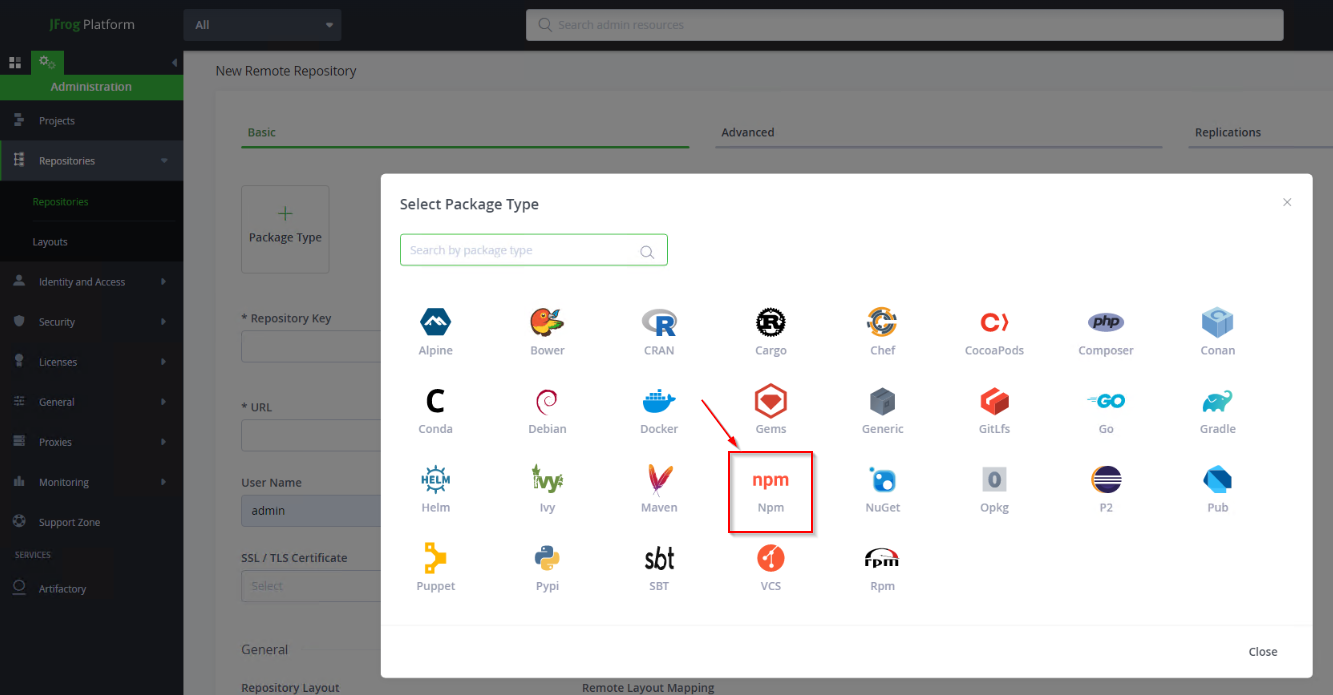
In the newly-opened window, enter the required repository key.
Click Create Remote Repository.
Set-up the associated package manager
Now, from the Application tab, navigate to Artifactory → Artifacts → select your newly created repository.
At the upper-right corner, click Set Me Up and follow the provided instructions.
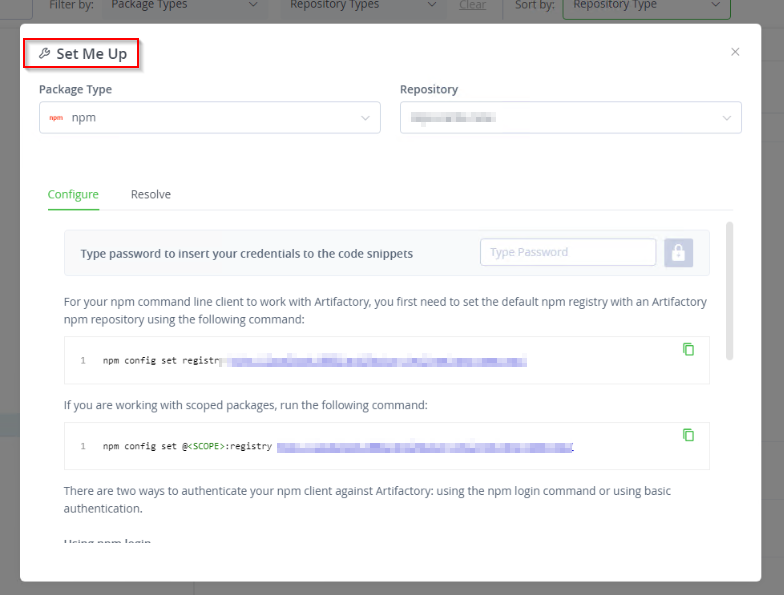
NPM Package Manager
Run the following command in your terminal:
CODEnpm config set registry http://your-artifactory-url:port/artifactory/api/npm/repo-name/Using the credentials set when creating the Artifactory repository, run the following command:
CODEnpm login
A configuration message should appear when successful.
SCD Logs
Log Location
The Artifactory service log file can be found under - $JFROG_HOME\artifactory\var\log\artifactory-service.log. It can also be viewed in JFrog from the Administration tab under Monitoring → System Logs → Select Log File → artifactory-service.log.
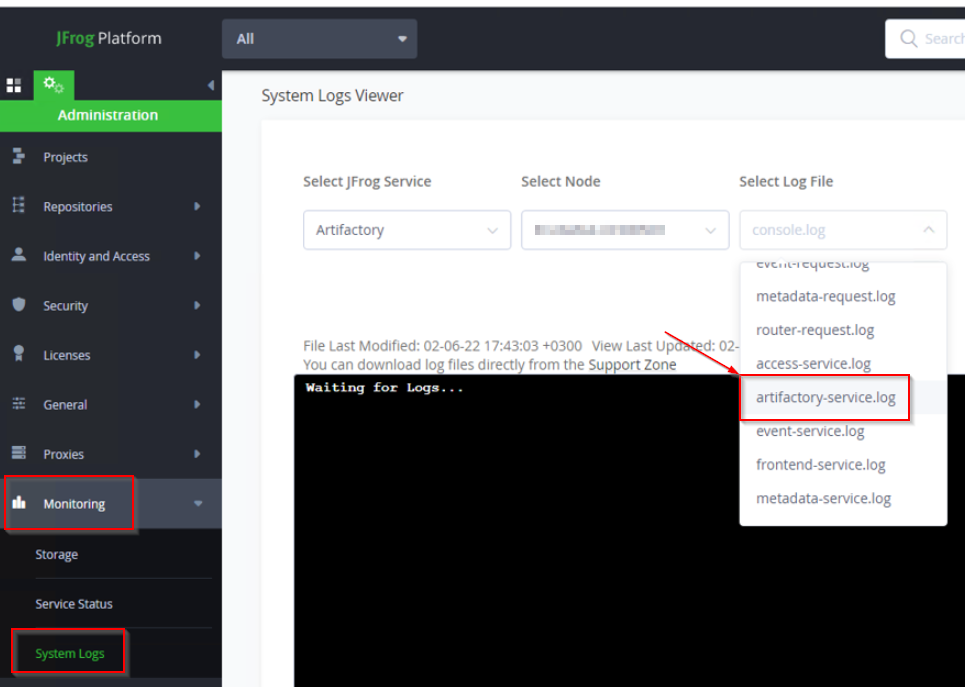
Log Examples
triggerBeforeRemoteDownload
The following log message will be displayed when trying to install a “bad” package via a package manager:
[WARN] beforeRemoteDownload - Rejected package even-more-externals:3.0.0 request - Diffend status: LibraryQueryResponse{status='blocked'}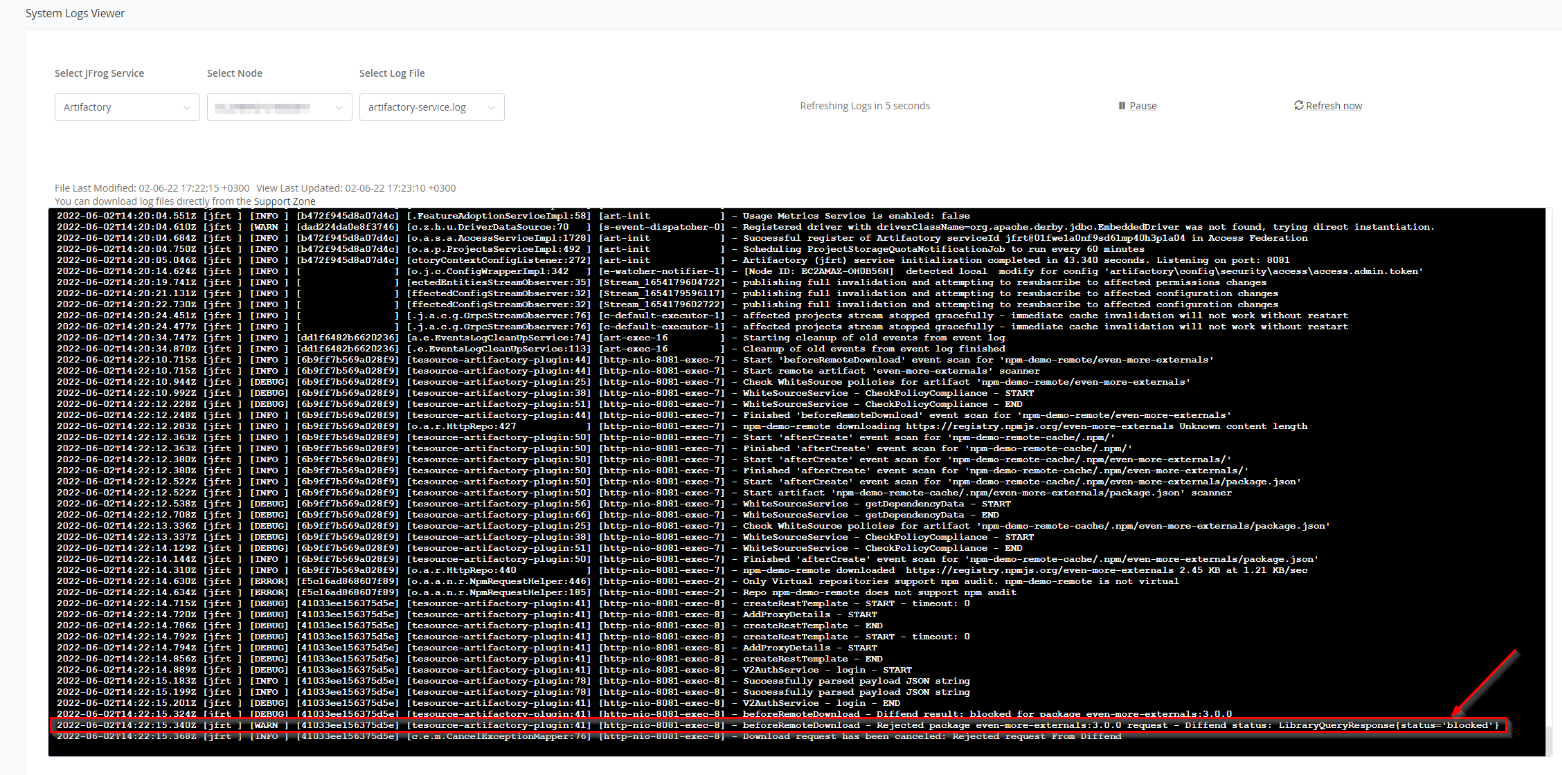
For both NPM and Ruby, you will receive a 403 http status code as the requested package is being blocked.
NPM
Ruby
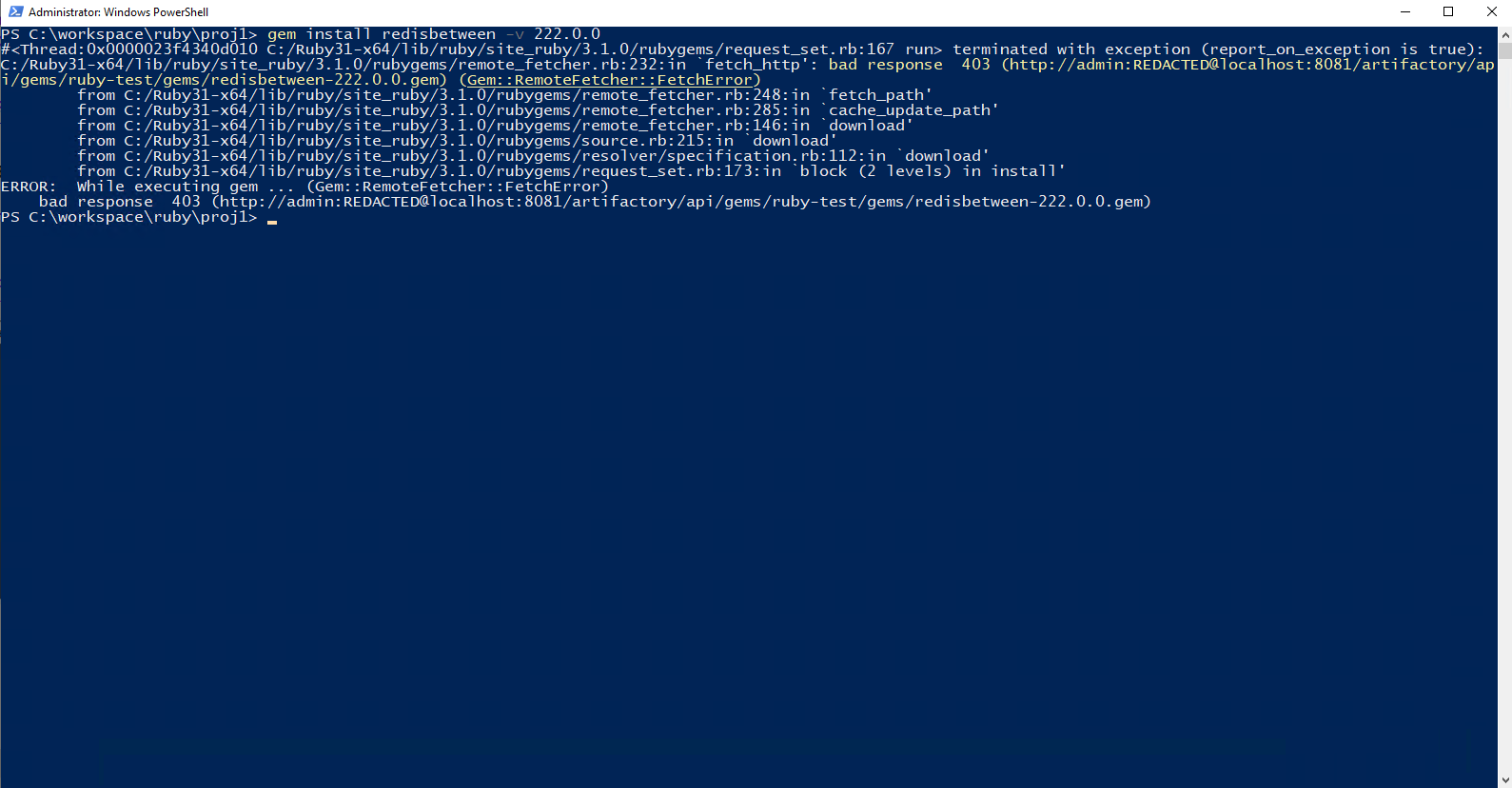
Cron-based Job
The following messages will be displayed when a “blocked” package is detected during a cron scan:
[INFO] - DiffendAgent - START - Cron artifacts scan
[WARN] - checkArtifacts - Bad Package - Action needed for PackageInfo{npm:even-more-externals:3.0.0}
[INFO] - move - START - move artifact npm-demo-remote-cache:even-more-externals/-/even-more-externals-3.0.0.tgz into quarantine-repo
[INFO] - move - END - Success moving artifact npm-demo-remote-cache:even-more-externals/-/even-more-externals-3.0.0.tgz into quarantine-repo
[INFO] - DiffendAgent - End - Cron artifacts scan
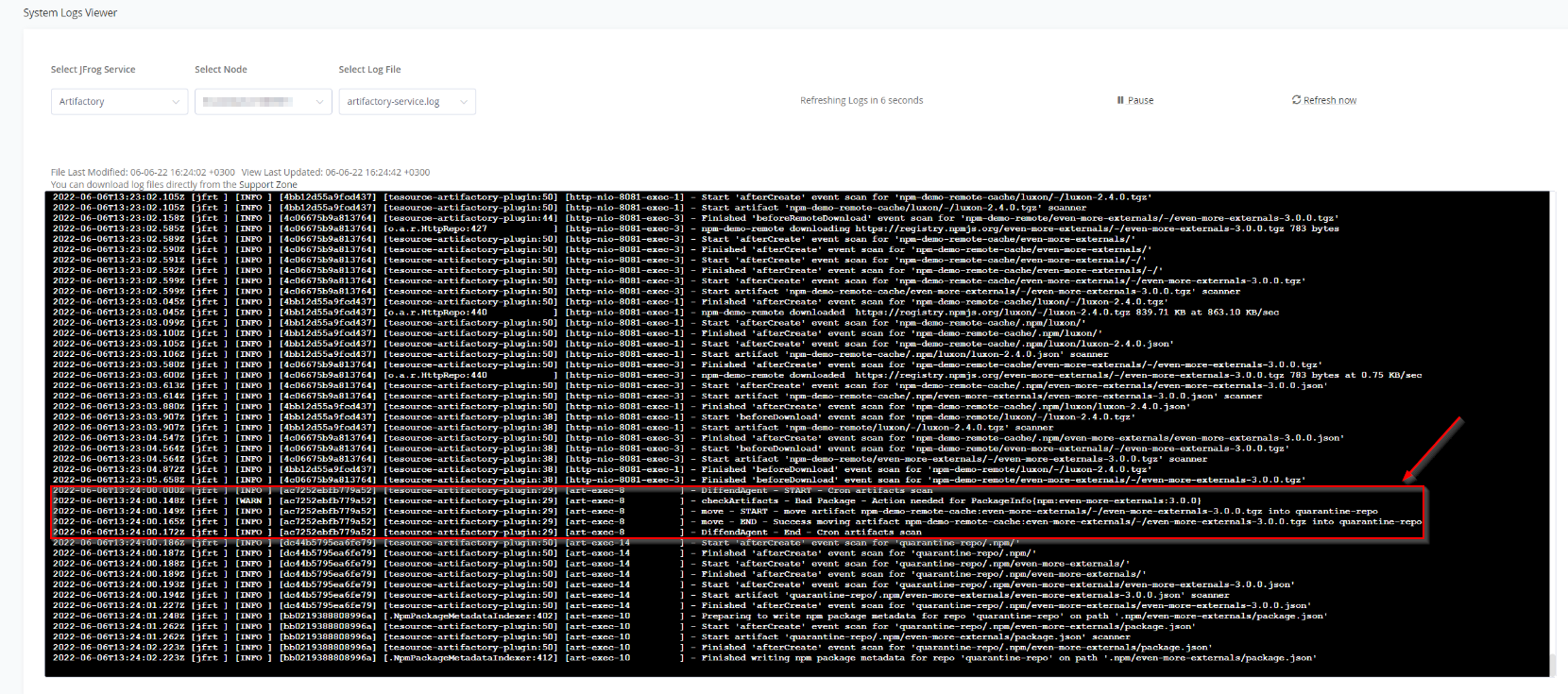
(SCD) Non-supported repository
The following log message will be printed when running the SCD integration on a non-supported repository (SCD only supports NPM and Ruby):
[DEBUG] - isDiffendSupported - Unsupported diffend registry type: maven: repository: maven-remoteAppending SCD Logs
You can edit the logback.xml file located at $JFROG_HOME/artifactory/var/etc/artifactory/logback.xml to include the SCD logs. The new log file, wss-plugin.log, will be available at $JFROG_HOME\artifactory\var\log.
To include the SCD logs, add the following inside the configuration element (between the <configuration> and </configuration> tags):
<appender name="WSS-PLUGIN-APPENDER" class="ch.qos.logback.core.rolling.RollingFileAppender">
<File>${log.dir}/wss-plugin.log</File>
<rollingPolicy class="org.jfrog.common.logging.logback.rolling.FixedWindowWithDateRollingPolicy">
<FileNamePattern>${log.dir.archived}/wss-plugin.%i.log.gz</FileNamePattern>
</rollingPolicy>
<triggeringPolicy class="org.jfrog.common.logging.logback.triggering.SizeAndIntervalTriggeringPolicy">
<MaxFileSize>25MB</MaxFileSize>
</triggeringPolicy>
<encoder class="ch.qos.logback.core.encoder.LayoutWrappingEncoder">
<layout class="org.jfrog.common.logging.logback.layout.BackTracePatternLayout">
<pattern>%date{yyyy-MM-dd'T'HH:mm:ss.SSS, UTC}Z [jfrt ] [%-5p] [%-16X{uber-trace-id}] [%-30.30(%c{3}:%L)] [%-20.20thread] - %m%n</pattern>
</layout>
</encoder>
</appender>
<logger name="whitesource-artifactory-plugin" level="info">
<appender-ref ref="WSS-PLUGIN-APPENDER"/>
</logger>
SCD Integration Log Levels
The default log level for the plugin is "info". After verifying the plugin is working as expected, it is recommended that you change the log level to "warn" (to reduce noise). In the case of troubleshooting, it is recommended that you set the log level to "debug".
To change the plugin log level, add the following to ${ARTIFACTORY_HOME}/etc/logback.xml:
<logger name="whitesource-artifactory-plugin">
<level value="info"/>
</logger>
